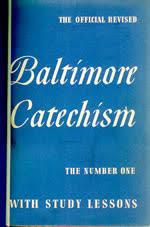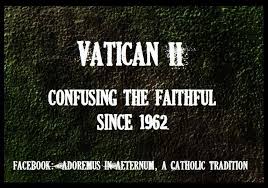October 20, 2015
Development of an error in the Catholic Church

 From the Baltimore Catechism to Vatican Council II and the Catechism of the Catholic Church (1992) we can see the development of a new doctrine, an irrationality, to negate the centuries old dogma extra ecclesiam nulla salus (EENS), defined by three Church Councils.With the development of the irrationality in magisterial documents, the old ecclesiology was discarded.
From the Baltimore Catechism to Vatican Council II and the Catechism of the Catholic Church (1992) we can see the development of a new doctrine, an irrationality, to negate the centuries old dogma extra ecclesiam nulla salus (EENS), defined by three Church Councils.With the development of the irrationality in magisterial documents, the old ecclesiology was discarded.
315. What is Baptism?
 CATECHISM OF POPE PIUS X
CATECHISM OF POPE PIUS X
 Since 29 Q does not refer to an explicit, objectively seen case, it does not contradict 27Q which states ,' No, no one can be saved outside the Catholic, Apostolic Roman Church, just as no one could be saved from the flood outside the Ark of Noah, which was a figure of the Church'.
Since 29 Q does not refer to an explicit, objectively seen case, it does not contradict 27Q which states ,' No, no one can be saved outside the Catholic, Apostolic Roman Church, just as no one could be saved from the flood outside the Ark of Noah, which was a figure of the Church'.
We must remember that being saved with the baptism of desire, baptism of blood or in invincible ignorance refer to invisible cases for us.So B does not contradict A.The Letter made a mistake.

VATICAN COUNCIL II
B
However we can correct the error in future. Avoid it in the interpretation of Vatican Council II.I have done it numerous times on this blog.
I know that B is always invisible and not known to us. So the confusing text is there in the Magisterial documents but it does not contradict the traditional teaching on the necessity of the baptism of water for all. It is not confusing if B is considered invisible for us. It would then also not contradict the strict interpretation of the dogma extra ecclesiam nulla salus and the old ecclesiology.

BALTIMORE CATECHISM
321. How can those be saved who through no fault of their own have not received the sacrament of Baptism?Those who through no fault of their own have not received the sacrament of Baptism can be saved through what is called baptism of blood or baptism of desire.
322. How does an unbaptized person receive the baptism of blood?
322. How does an unbaptized person receive the baptism of blood?
An unbaptized person receives the baptism of blood when he suffers martyrdom for the faith of Christ.
Greater love than this no one has, that one lay down his life for his friends. (John 15:13)
323. How does an unbaptized person receive the baptism of desire?
An unbaptized person receives the baptism of desire when he loves God above all things and desires to do all that is necessary for his salvation. - Baptism. Lesson 24 from the Baltimore Cathechism
I have mentioned in a previous blog post 1 that there are no physical cases of the baptism of desire and blood, they cannot be known and seen on earth, as we see the baptism of water. The baptism of water can be given.It can be repeated.Greater love than this no one has, that one lay down his life for his friends. (John 15:13)
323. How does an unbaptized person receive the baptism of desire?
An unbaptized person receives the baptism of desire when he loves God above all things and desires to do all that is necessary for his salvation. - Baptism. Lesson 24 from the Baltimore Cathechism
The baptism of desire and blood cannot be given and repeated and we do not know of any such case personally.So they are not exceptions to all needing the baptism of water to avoid Hell.
These cases are not relevant to all needing the baptism of water, the necessity of the baptism of water for salvation. So they should not have been placed in this section of the Baltimore Catechism.
They do not contradict the following passages from the same Catechism.
315. What is Baptism?
Baptism is the sacrament that gives our souls the new life of sanctifying grace by which we become children of God and heirs of heaven.
Amen, amen, I say to thee, unless a man be born again of water and the Spirit, he cannot enter into the kingdom of God. (John 3:5)
Get up and be baptized and wash away thy sins, calling on his name. (Acts 22:16)
Now they who received his word were baptized, and there were added that day about three thousand souls. (Acts 2:41) 2
We must remember that being saved with the baptism of desire, baptism of blood or in invincible ignorance refer to invisible cases for us.Since they are not objectively seen they do not contradict the Baltiomore Catechism when it states ' Baptism is necessary for the salvation of all men...'.
Amen, amen, I say to thee, unless a man be born again of water and the Spirit, he cannot enter into the kingdom of God. (John 3:5)
316. What sins does Baptism take away?
Baptism takes away original sin; and also actual sin and all the punishment due to them, if the person baptized be guilty of any actual sins and truly sorry for them.Get up and be baptized and wash away thy sins, calling on his name. (Acts 22:16)
317. What are the effects of the character imprinted on the soul by Baptism?
The effects of the character imprinted on the soul by Baptism are that we become members of the Church, subject to its laws, and capable of receiving other sacraments.320. Why is Baptism necessary for the salvation of all men?
Baptism is necessary for the salvation of all men because Christ has said: "Unless a man be born again of water and the spirit, he cannot enter into the kingdom of God."Now they who received his word were baptized, and there were added that day about three thousand souls. (Acts 2:41) 2
We must remember that being saved with the baptism of desire, baptism of blood or in invincible ignorance refer to invisible cases for us.Since they are not objectively seen they do not contradict the Baltiomore Catechism when it states ' Baptism is necessary for the salvation of all men...'.
It is necessary for all with no exceptions.
_________________________________
_________________________________
27 Q. Can one be saved outside the Catholic, Apostolic and Roman Church?
A. No, no one can be saved outside the Catholic, Apostolic Roman Church, just as no one could be saved from the flood outside the Ark of Noah, which was a figure of the Church.
29 Q. But if a man through no fault of his own is outside the Church, can he be saved?
A. If he is outside the Church through no fault of his, that is, if he is in good faith, and if he has received Baptism, or at least has the implicit desire of Baptism; and if, moreover, he sincerely seeks the truth and does God’s will as best he can such a man is indeed separated from the body of the Church, but is united to the soul of the Church and consequently is on the way of salvation. -Catechism of Pope Pius X, Rome 1905
Again we must note, I repeat, that being saved with the baptism of desire, baptism of blood or in invincible ignorance refer to invisible cases for us .There should have been no reference to it here.The same errror of the Baltimore Catechism has been placed in the Catechism of Pope Pius X.
__________________
LETTER OF THE HOLY OFFICE 1949
The Baltimore Catechism error was accepted by the Letter of the Holy Office 1949 issued by Cardinal Francesco Marchetti Selvaggiani to the Archbishop of Boston and which was made public some three years after it was issued.
The first part of the Letter affirms the dogma and the necessity of the baptism of water.I refer to it as A.
A
Now, among those things which the Church has always preached and will never cease to preach is contained also that infallible statement by which we are taught that there is no salvation outside the Church.
Now, in the first place, the Church teaches that in this matter there is question of a most strict command of Jesus Christ. For He explicitly enjoined on His apostles to teach all nations to observe all things whatsoever He Himself had commanded (Matt. 28: 19-20).
Now, among the commandments of Christ, that one holds not the least place by which we are commanded to be incorporated by baptism into the Mystical Body of Christ, which is the Church, and to remain united to Christ and to His Vicar, through whom He Himself in a visible manner governs the Church on earth.
The second part of the Letter mentions exceptions to the first part.I refer to these passages as B and they are in red.The Letter contradicts itself.
B
Therefore, no one will be saved who, knowing the Church to have been divinely established by Christ, nevertheless refuses to submit to the Church or withholds obedience from the Roman Pontiff, the Vicar of Christ on earth.
In His infinite mercy God has willed that the effects, necessary for one to be saved, of those helps to salvation which are directed toward man's final end, not by intrinsic necessity, but only by divine institution, can also be obtained in certain circumstances when those helps are used only in desire and longing.
Therefore, that one may obtain eternal salvation, it is not always required that he be incorporated into the Church actually as a member, but it is necessary that at least he be united to her by desire and longing.
but when a person is involved in invincible ignorance God accepts also an implicit desire, so called because it is included in that good disposition of soul whereby a person wishes his will to be conformed to the will of God.
With these wise words he reproves both those who exclude from eternal salvation all united to the Church only by implicit desire...
From these declarations which pertain to doctrine, certain conclusions follow which regard discipline and conduct...
In His infinite mercy God has willed that the effects, necessary for one to be saved, of those helps to salvation which are directed toward man's final end, not by intrinsic necessity, but only by divine institution, can also be obtained in certain circumstances when those helps are used only in desire and longing.
Therefore, that one may obtain eternal salvation, it is not always required that he be incorporated into the Church actually as a member, but it is necessary that at least he be united to her by desire and longing.
but when a person is involved in invincible ignorance God accepts also an implicit desire, so called because it is included in that good disposition of soul whereby a person wishes his will to be conformed to the will of God.
With these wise words he reproves both those who exclude from eternal salvation all united to the Church only by implicit desire...
From these declarations which pertain to doctrine, certain conclusions follow which regard discipline and conduct...
Since B does not refer to explicit, objectively seen cases it cannot contradict A.There can be no known exceptions to the Feeneyite version of the dogma on exclusive salvation in the Church.
When it states ' no one will be saved who, knowing...' it assumes those saved in invincible ignorance refer to known cases in our reality, in the present times. They are saved in their ignorance. For the 1949 Magisterium they are not culpable.They are exceptions to all needing the baptism of water.On the other hand those who 'know', who are not in inculpable ignorance and who are seen and known in the present times, for the Magisterium , were on the way to Hell.This is irrational. Since these cases would be known only to God.
We cannot judge who knows or does not know and will be saved. They are zero cases in our reality. So they are not relevant or exceptions to the dogma.This is a new doctrine which was 'developed' in the Letter of the Holy Office 1949.
This error was placed in Vatican Council II (LG 14)
_________________We cannot judge who knows or does not know and will be saved. They are zero cases in our reality. So they are not relevant or exceptions to the dogma.This is a new doctrine which was 'developed' in the Letter of the Holy Office 1949.
This error was placed in Vatican Council II (LG 14)
VATICAN COUNCIL II
Therefore, all must be converted to Him, made known by the Church's preaching, and all must be incorporated into Him by baptism and into the Church which is His body. For Christ Himself "by stressing in express language the necessity of faith and baptism (cf. Mark 16:16; John 3:5), at the same time confirmed the necessity of the Church, into which men enter by baptism, as by a door. Therefore those men cannot be saved, who though aware that God, through Jesus Christ founded the Church as something necessary, still do not wish to enter into it, or to persevere in it."(17) Therefore though God in ways known to Himself can lead those inculpably ignorant of the Gospel to find that faith without which it is impossible to please Him (Heb. 11:6), yet a necessity lies upon the Church (1 Cor. 9:16), and at the same time a sacred duty, to preach the Gospel. -Ad Gentes 7, Vatican Council II
A
Therefore, all must be converted to Him, made known by the Church's preaching, and all must be incorporated into Him by baptism and into the Church which is His body. For Christ Himself "by stressing in express language the necessity of faith and baptism (cf. Mark 16:16; John 3:5), at the same time confirmed the necessity of the Church, into which men enter by baptism, as by a door.
Therefore those men cannot be saved, who though aware that God, through Jesus Christ founded the Church as something necessary, still do not wish to enter into it, or to persevere in it."(17) Therefore though God in ways known to Himself can lead those inculpably ignorant of the Gospel to find that faith without which it is impossible to please Him
Again I repeat being saved with the baptism of desire, baptism of blood or in invincible ignorance refer to invisible cases for us.So B does not contradict A.
B is superflous.
It should not have been placed in Vatican Council II.
The same mistake is made in Lumen Gentium 14.
The error in Vatican Council II is carried over from the Baltimore Catechism because B was supposed to be explicit.The same mistake is made in Lumen Gentium 14.
However we can correct the error in future. Avoid it in the interpretation of Vatican Council II.I have done it numerous times on this blog.
I know that B is always invisible and not known to us. So the confusing text is there in the Magisterial documents but it does not contradict the traditional teaching on the necessity of the baptism of water for all. It is not confusing if B is considered invisible for us. It would then also not contradict the strict interpretation of the dogma extra ecclesiam nulla salus and the old ecclesiology.
-Lionel Andrades
1
_________________________
Bishop Bernard Fellay made a mistake : there is no denial from the SSPX USA over two years
Bishop Bernard Fellay made a mistake : there is no denial from the SSPX USA over two years

Bishop Bernard Fellay the Superior General of the Society of St.Pius X (SSPX) in his Letter to Friends and Benefactors no. 82 says 'The same declaration (LG. 8) also recognizes the presence of “salvific elements” in non-Catholic Christian communities' and the SSPX bishop concludes that 'Such statements are irreconcilable with the dogma “No salvation outside of the Church,” which was reaffirmed by a Letter of the Holy Office on August 8, 1949.
The expression “subsistit in” (Lumen gentium, 8) means that the Church of Christ has in the separate Christian communities a presence and an action that are distinct from the Church of Christ’s subsistence in the Catholic Church.Taken in this sense, the expression denies the strict necessity of identifying the Church of Christ with the Catholic Church, which had always been taught, especially by Pius XII, both in Mystici corporis[2] and Humani generis[3].The Church of Christ is present and active as such, that is, as the unique ark of salvation, only where the Vicar of Christ is present. The Mystical Body of which he is the visible head is strictly identical to the Roman Catholic Church.)
The same declaration (LG, 8) also recognizes the presence of “salvific elements” in non-Catholic Christian communities
The decree on ecumenism goes even further, adding that “the Spirit of Christ does not refrain from using these churches and communities as means of salvation, which derive their efficacy from the fullness of grace and truth entrusted to the Catholic Church.” (UR, 3) such statements are irreconcilable with the dogma “No salvation outside of the Church,” which was reaffirmed by a Letter of the Holy Office on August 8, 1949.
'the expression denies the strict necessity of identifying the Church of Christ with the Catholic Church, which had always been taught, especially by Pius XII, both in Mystici corporis[2] and Humani generis['
Lionel: Why does it deny it ? Since these cases are explicit and so are exceptions to the dogma extra ecclesiam nulla salus ? We see the error of the Baltimore Catechism here.
'The same declaration (LG, 8) also recognizes the presence of “salvific elements” in non-Catholic Christian communities'
Lionel: So what? Are they explicit and known to us and so they are relevant to the dogma?
“the Spirit of Christ does not refrain from using these churches and communities as means of salvation, which derive their efficacy from the fullness of grace and truth entrusted to the Catholic Church.” (UR, 3) such statements are irreconcilable with the dogma “No salvation outside of the Church,” which was reaffirmed by a Letter of the Holy Office on August 8, 1949.
Lionel: He assumes there are irreconcilable with the dogma, since for him these cases are explicit. He is not aware of the objective error in the Baltimore Catechism.
-Lionel Andrades
http://eucharistandmission.blogspot.it/2014/09/april-23-sept112014-still-no.html
http://eucharistandmission.blogspot.it/2014/08/april-13-august-242014-and-still-no.html#links



No comments:
Post a Comment